2017八年级英语上册Unit6BirdwatchingGrammar牛津版!
牛津版八年级上册第六章第二节:Unit 6 Birdwatching
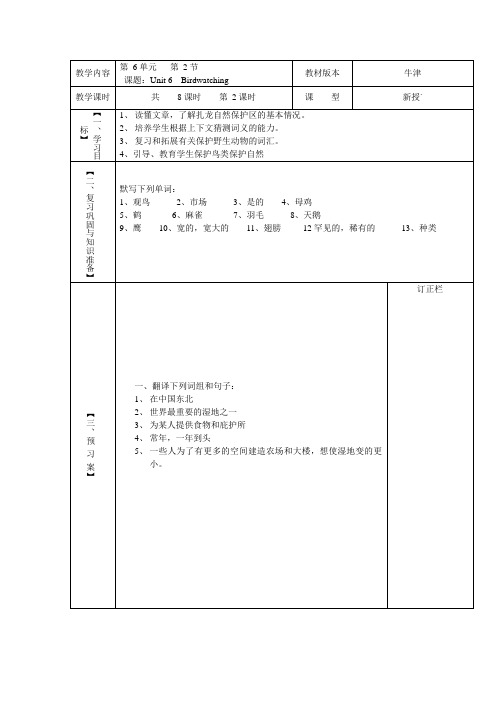
1、观鸟2、市场3、是的4、母鸡
5、鹤6、麻雀7、羽毛8、天鹅
9、鹰10、宽的,宽大的11、翅膀12罕见的,稀有的13、种类
【三、预习案】
一、翻译下列词组和句子:
1、在中国东北
2、世界最重要的湿地之一
3、为某人提供食物和庇护所
4、常年,一年到头
5、一些人为了有更多的空间建造农场和大楼,想使湿地变的更小。
【六、当堂检测】
用方框中所给词组填空:
1.all year round, 2. in order to 3. as a result 4. for a short stay, 5. less and less space
1._________catch up with the early bus, Simon got up much earlier than before this morning.
教学内容
第6单元第2节
课题:Unit 6 Birdwatching
教材版本
牛津
教学课时
共8课时第2课时
课型
新授`
【一、学习目标】
1、读懂文章,了解扎龙自然保护区的基本情况。
2、培养学生根据上下文猜测词义的能力。
3、复习和拓展有关保护野生动物的词汇。
4、引导、教育学生保护鸟类保护自然
【二、复习巩固与知识准备】
4.The new hospital __________(to give something to somebody ) free medical service for poor people.
5.We can see a lot of _________(野生动物) in Zhalong nature Reserve.
推荐八年级英语上册Unit6BirdwatchingGrammar教案(新版)牛津版
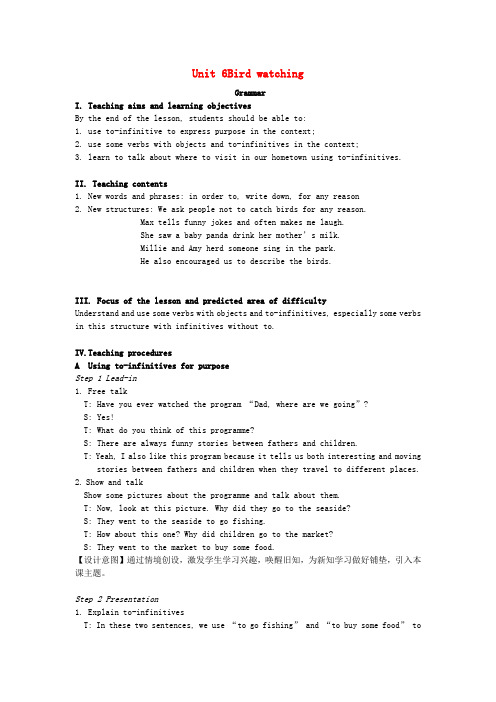
Unit 6Bird watchingGrammarI. Teaching aims and learning objectivesBy the end of the lesson, students should be able to:1. use to-infinitive to express purpose in the context;2. use some verbs with objects and to-infinitives in the context;3. learn to talk about where to visit in our hometown using to-infinitives.II. Teaching contents1. New words and phrases: in order to, write down, for any reason2. New structures: We ask people not to catch birds for any reason.Max tells funny jokes and often makes me laugh.She saw a baby panda drink her mother’s milk.Millie and Amy herd someone sing in the park.He also encouraged us to describe the birds.III. Focus of the lesson and predicted area of difficultyUnderstand and use some verbs with objects and to-infinitives, especially some verbs in this structure with infinitives without to.IV.Teaching proceduresA Using to-infinitives for purposeStep 1 Lead-in1. Free talkT: Have you ever watched the program “Dad, where are we going”?S: Yes!T: What do you think of this programme?S: There are always funny stories between fathers and children.T: Yeah, I also like this program because it tells us both interesting and moving stories between fathers and children when they travel to different places.2.Show and talkShow some pictures about the programme and talk about them.T: Now, look at this picture. Why did they go to the seaside?S: They went to the seaside to go fishing.T: How about this one? Why did children go to the market?S: They went to the market to buy some food.【设计意图】通过情境创设,激发学生学习兴趣,唤醒旧知,为新知学习做好铺垫,引入本课主题。
【教育专用】八年级英语上册Unit6Birdwatching词汇与语法基础训练新版牛津版

Unit 6 Birdwatching 知识精讲一、必背词汇market n. 市场hen n. 母鸡crane n. 鹤sparrow n. 麻雀feather n. 羽毛swan n. 天鹅eagle n. 鹰broad adj. 宽的,宽大的wing n. 翅膀type n. 种类rare adj. 罕见的,稀有的nature n. 大自然,自然界wetland n. (尤指为野生动物保存的)湿地provide vt. 提供cover n. 庇护所 vt. 覆盖;包括wildlife n. 野生动物perfect adj. 极好的,完美的round adv. 周围,绕一整圈;转过来while conj. 然而stay n. 停留,逗留easily adv. 容易地,不费力地percent n. 百分之……space n. 空间lead vi. & vt. 领导,带领fisherman n. n. 渔民,钓鱼的人government n. 政府prevent vt. 防止,预防record vt. 记录tourist n. 旅行者,观光者count vt. & vi. 计算(或清点)总数;数数describe vt. 描述understand vt. & vi. 理解,明白importance n. 重要性binoculars n. [复]望远镜clearly adv. 清晰地speaker n. 说话人;演讲者tour n. 旅行application n. 申请form n. 表格;形式address n. 地址chairperson n. 主席introduce vt. 介绍natural adj. 自然的,天然的society n. 协会;社会bird-watching n. 观鸟change n. 改变,变化二、重点词汇1. lead verb /liːd/1).v. to control a group of people, a country, or a situation领导,带领,率领例句:I’ve asked Gemma to lea d the discussion.我已请杰玛组织大家讨论。
牛津译林版八年级上Unit6BirdwatchingGrammarTask教学设计
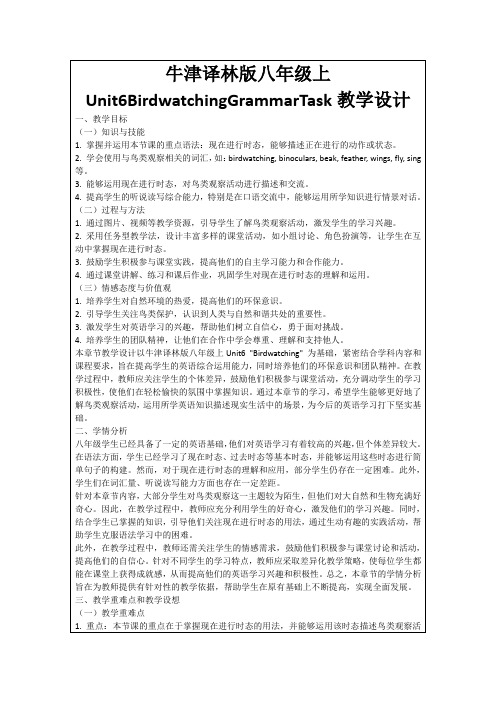
一、教学目标
(一)知识与技能
1.掌握并运用本节课的重点语法:现在进行时态,能够描述正在进行的动作或状态。
2.学会使用与鸟类观察相关的词汇,如:birdwatching, binoculars, beak, feather, wings, fly, sing等。
(二)教学设想
1.利用多媒体资源,如图片、视频等,导入鸟类观察主题,激发学生的学习兴趣,为后续语法学习奠定基础。
2.创设情境,引导学生通过观察鸟类图片或视频,运用现在进行时态进行描述,帮助学生理解并掌握语法知识点。
a.教师展示鸟类图片或视频,引导学生关注鸟类的动作和状态。
b.教师示范如何用现在进行时态描述鸟类动作,如:“The bird is flying over the lake.”
3.能够运用现在进行时态,对鸟类观察活动进行描述和交流。
4.提高学生的听说读写综合能力,特别是在口语交流中,能够运用所学知识进行情景对话。
(二)过程与方法
1.通过图片、视频等教学资源,引导学生了解鸟类观察活动,激发学生的学习兴趣。
2.采用任务型教学法,设计丰富多样的课堂活动,如小组讨论、角色扮演等,让学生在互动中掌握现在进行时态。
2.通过对比现在进行时态与其他时态,如一般现在时、一般过去时,让学生区分不同时态的用法。
3.引导学生关注现在进行时态的结构:be动词(am/is/are)+动词ing形式。
4.示例讲解,如:“The bird is singing in the tree.”,并解释现在进行时态在此句中的用法。
(三)学生小组讨论(500字)
针对本章节内容,大部分学生对鸟类观察这一主题较为陌生,但他们对大自然和生物充满好奇心。因此,在教学过程中,教师应充分利用学生的好奇心,激发他们的学习兴趣。同时,结合学生已掌握的知识,引导他们关注现在进行时态的用法,通过生动有趣的实践活动,帮助学生克服语法学习中的困难。
八年级英语上册unit6 bird watching词汇与语法基础训练新版牛津版
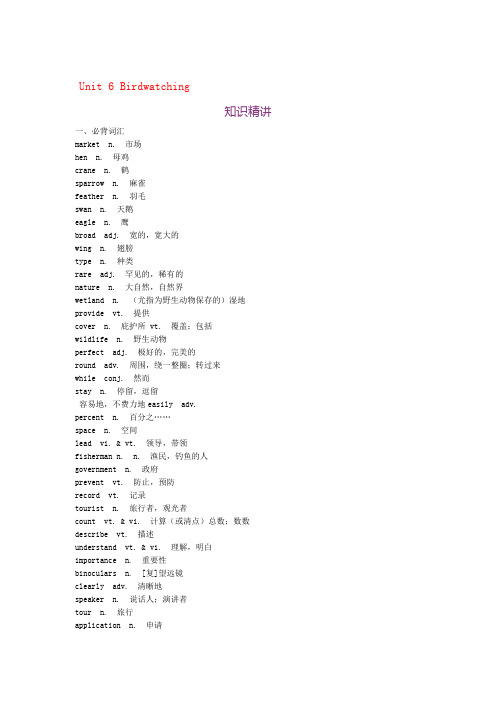
Unit 6 Birdwatching知识精讲一、必背词汇market n. 市场hen n. 母鸡crane n. 鹤sparrow n. 麻雀feather n. 羽毛swan n. 天鹅eagle n. 鹰broad adj. 宽的,宽大的wing n. 翅膀type n. 种类rare adj. 罕见的,稀有的nature n. 大自然,自然界wetland n. (尤指为野生动物保存的)湿地provide vt. 提供cover n. 庇护所 vt. 覆盖;包括wildlife n. 野生动物perfect adj. 极好的,完美的round adv. 周围,绕一整圈;转过来while conj. 然而stay n. 停留,逗留容易地,不费力地easily adv.percent n. 百分之……space n. 空间lead vi. & vt. 领导,带领fisherman n. n. 渔民,钓鱼的人government n. 政府prevent vt. 防止,预防record vt. 记录tourist n. 旅行者,观光者count vt. & vi. 计算(或清点)总数;数数describe vt. 描述understand vt. & vi. 理解,明白importance n. 重要性binoculars n. [复]望远镜clearly adv. 清晰地speaker n. 说话人;演讲者tour n. 旅行application n. 申请form n. 表格;形式address n. 地址chairperson n. 主席introduce vt. 介绍natural adj. 自然的,天然的society n. 协会;社会观鸟bird-watching n.改变,变化change n.二、重点词汇1. lead verb /li?d/1).v. to control a group of people, a country, or a situation领导,带领,率领例句:I've asked Gemma to lead the discussion.我已请杰玛组织大家讨论。
八年级英语上册 Unit 6 Birdwatching Period 4 Grammar听写本 牛津
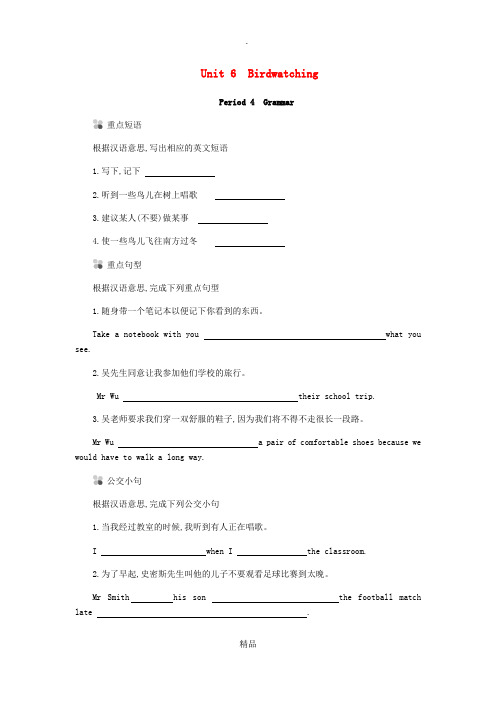
Unit 6 Birdwatching
Period 4 Grammar
重点短语
根据汉语意思,写出相应的英文短语
1.写下,记下
2.听到一些鸟儿在树上唱歌
3.建议某人(不要)做某事
4.使一些鸟儿飞往南方过冬
重点句型
根据汉语意思,完成下列重点句型
1.随身带一个笔记本以便记下你看到的东西。
Take a notebook with you what you see.
2.吴先生同意让我参加他们学校的旅行。
Mr Wu their school trip.
3.吴老师要求我们穿一双舒服的鞋子,因为我们将不得不走很长一段路。
Mr Wu a pair of comfortable shoes because we would have to walk a long way.
公交小句
根据汉语意思,完成下列公交小句
1.当我经过教室的时候,我听到有人正在唱歌。
I when I the classroom.
2.为了早起,史密斯先生叫他的儿子不要观看足球比赛到太晚。
Mr Smith his son the football match late .
如有侵权请联系告知删除,感谢你们的配合!。
精选八年级英语上册Unit6Birdwatching词汇与语法基础训练新版牛津版
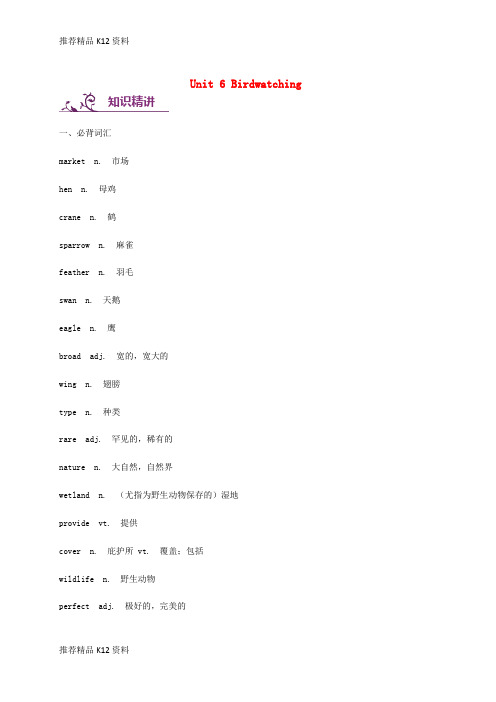
Unit 6 Birdwatching 知识精讲一、必背词汇market n. 市场hen n. 母鸡crane n. 鹤sparrow n. 麻雀feather n. 羽毛swan n. 天鹅eagle n. 鹰broad adj. 宽的,宽大的wing n. 翅膀type n. 种类rare adj. 罕见的,稀有的nature n. 大自然,自然界wetland n. (尤指为野生动物保存的)湿地provide vt. 提供cover n. 庇护所 vt. 覆盖;包括wildlife n. 野生动物perfect adj. 极好的,完美的round adv. 周围,绕一整圈;转过来while conj. 然而stay n. 停留,逗留easily adv. 容易地,不费力地percent n. 百分之……space n. 空间lead vi. & vt. 领导,带领fisherman n. n. 渔民,钓鱼的人government n. 政府prevent vt. 防止,预防record vt. 记录tourist n. 旅行者,观光者count vt. & vi. 计算(或清点)总数;数数describe vt. 描述understand vt. & vi. 理解,明白importance n. 重要性binoculars n. [复]望远镜clearly adv. 清晰地speaker n. 说话人;演讲者tour n. 旅行application n. 申请form n. 表格;形式address n. 地址chairperson n. 主席introduce vt. 介绍natural adj. 自然的,天然的society n. 协会;社会bird-watching n. 观鸟change n. 改变,变化二、重点词汇1. lead verb /liːd/1).v. to control a group of people, a country, or a situation领导,带领,率领例句:I’ve asked Gemma to lea d the discussion.我已请杰玛组织大家讨论。
新译林牛津8A_Unit_6__Birdwatching词组、句型、语法
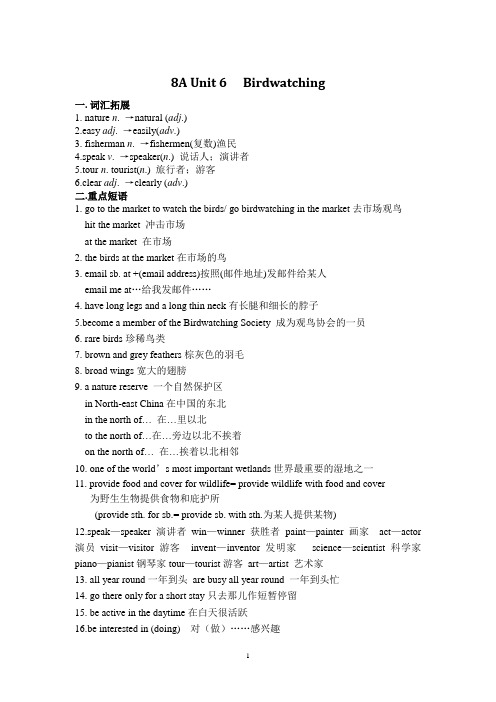
8A Unit 6 Birdwatching一.词汇拓展1. nature n. →natural (adj.)2.easy adj. →easily(adv.)3. fisherman n. →fishermen(复数)渔民4.speak v. →speaker(n.) 说话人;演讲者5.tour n. tourist(n.) 旅行者;游客6.clear adj. →clearly (adv.)二.重点短语1. go to the market to watch the birds/ go birdwatching in the market去市场观鸟hit the market 冲击市场at the market 在市场2. the birds at the market在市场的鸟3. email sb. at +(email address)按照(邮件地址)发邮件给某人email me at…给我发邮件……4. have long legs and a long thin neck有长腿和细长的脖子5.become a member of the Birdwatching Society 成为观鸟协会的一员6. rare birds珍稀鸟类7. brown and grey feathers棕灰色的羽毛8. broad wings宽大的翅膀9. a nature reserve 一个自然保护区in North-east China在中国的东北in the north of… 在…里以北to the north of…在…旁边以北不挨着on the north of…在…挨着以北相邻10. one of the world’s most important wetlands世界最重要的湿地之一11. provide food and cover for wildlife= provide wildlife with food and cover为野生生物提供食物和庇护所(provide sth. for sb.= provide sb. with sth.为某人提供某物)12.speak—speaker 演讲者win—winner 获胜者paint—painter 画家act—actor 演员visit—visitor 游客invent—inventor 发明家science—scientist 科学家piano—pianist钢琴家tour—tourist游客art—artist 艺术家13. all year round一年到头are busy all year round 一年到头忙14. go there only for a short stay只去那儿作短暂停留15. be active in the daytime在白天很活跃16.be interested in (doing) 对(做)……感兴趣enjoy the natural world享受自然界(adj)17. 40 per cent of them他们中百分之四十18. make the wetlands smaller缩小湿地19. in order to have more space/food for farms and buildings为了腾出更多空间用作农田和建筑20. lead to less and less space for wildlife导致野生生物的空间越来越小(make space/room for为…腾出空间)lead to doing sth 导致做某事(lead—led)22. don’t have enough food to eat没有足够的食物吃23. the Chinese government中国政府23. have made laws to prevent all these things in Zhalong已经制定法律阻止在扎龙的所有这些事情24.prevent sb. (from) doing sth.= stop sb (from) doing= keep sb from doing 阻止某人做某事25. the members of our Birdwatching Society 观鸟协会的成员26. record their types记录它们的种类27. changes in their numbers它们数量上的变化28. a lot of tourists go to Zhalong to watch the birds许多游客去扎龙观鸟,29. invite them to help us邀请他们帮助我们count and describe birds 清点和描述鸟类30. need more people to count and describe the birds需要更多的人来数鸟和描述鸟31. understand the importance of the wetlands理解湿地的重要性the importance of protecting wildlifethe importance of=important32. stop / keep / prevent sth. from happening阻止某事发生33.in other parts of the world 在世界的其他部分34.take part in activities 参加活动35. take a notebook with you to (= in order to )write down what you see随身带笔记本为了写下你所看到的36. take a camera to take photos of …带相机去拍……的照片37. ask people not to catch birds for any reason要求人们不要为任何理由去捉鸟38. agree to let me join同意让我加入39. see a baby panda drink her mother’s milk看见熊猫宝宝喝它妈妈的奶(看见某人做了或常做某事see sb. do sth.、看见某人在做某事see sb. doing sth.)40. hear someone sing 听见某人唱歌(hear用法与see/ watch/notice相同)41. encourage sb.(not)to do sth. 鼓励某人(不要)做某事encouraging 鼓励的encouraged 受鼓舞的encouragementencourage /discourage sb. from doing42. advise us not to shout in the wetlands建议我们不要在湿地大叫43. different kinds of plants各种各样的植物44.sp. covers an area of…(=sp. be …in area.)某地覆盖……的面积45. square kilometres平方公里46. the second largest home to red-crowned cranes丹顶鹤的第二大家园be important to the health of people all over the world 对全世界人们的健康重要47. not only…but also…不仅……而且……(邻近原则)take a pair of binoculars 带一副望远镜see the birds more clearly 更清晰地看见鸟50. make beautiful sounds 发出优美的声音make different bird sounds 发出不同的鸟声51.at bird shows 在鸟展上on show 展出52.birds in the pictures 画里的鸟53.include birds in their poems 把鸟写进他们的诗里(v)--including 介词“包括”54.part of our lives 我们生活的一部分55.application form 申请表56. call sb. on + (phone number)拨打(电话号码)找某人57.in order to/so as to 为了58.introduce sb./sth to sb. 把某人或某物介绍给某人introduction 介绍、说明Let me introduce myself. 让我来自我介绍。
2017年牛津译林版初中英语八年级英语上册Unit6 Birdwatching教案
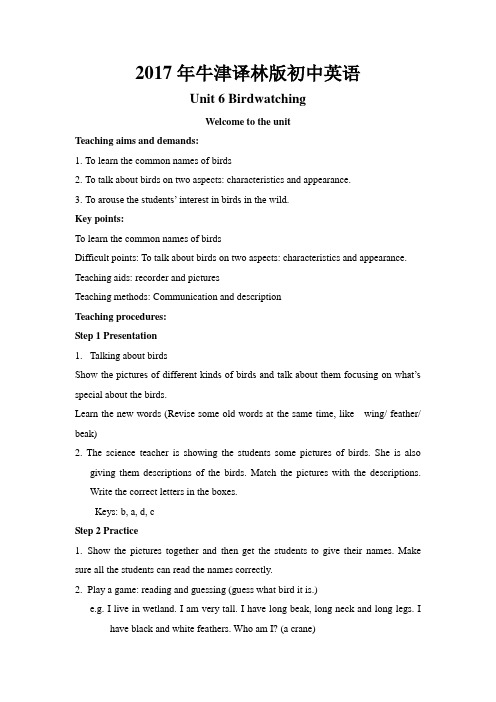
2017年牛津译林版初中英语Unit 6 BirdwatchingWelcome to the unitTeaching aims and demands:1.To learn the common names of birds2.To talk about birds on two aspects: characteristics and appearance.3.To arouse the students’ interest in birds in the wild.Key points:To learn the common names of birdsDifficult points: To talk about birds on two aspects: characteristics and appearance. Teaching aids: recorder and picturesTeaching methods: Communication and descriptionTeaching procedures:Step 1 Presentation1.Talking about birdsShow the pictures of different kinds of birds and talk about them focusing on what’s special about the birds.Learn the new words (Revise some old words at the same time, like wing/ feather/ beak)2. The science teacher is showing the students some pictures of birds. She is alsogiving them descriptions of the birds. Match the pictures with the descriptions.Write the correct letters in the boxes.Keys: b, a, d, cStep 2 Practice1. Show the pictures together and then get the students to give their names. Make sure all the students can read the names correctly.2. Play a game: reading and guessing (guess what bird it is.)e.g. I live in wetland. I am very tall. I have long beak, long neck and long legs. Ihave black and white feathers. Who am I? (a crane)3. Ask studentsWhich is your favorite bird? Why?Step 3 ProductionMake up new conversations using Part B as a model and act them out.Annie is asking Simon about birds. Work in pairs and talk about the birds you like. Use the conversation below as a model. The information in Part A may help you.A: What’s your favorite bird, …?B: I like …A: What do … look like?B: ...A: I guess you like...best. Right?B: ...A: Why do you like...best?B: Because...Step 4 Presentation1. Say: We love birds. Eddie loves birds, too. Listen to the tape and find the answers to the following questions.1) What is Eddie going to do?2) Does he really love birds?3) What kind of birds does he like best?2. Practice reading in pairs and try to act it out.Step 5 Explanation1. at the market 在市场上2. your favourite bird 你最喜欢的鸟3. look like 看起来像4. 15 types of cranes 15种鹤5. rare birds 罕见的鸟Step 6 Exercise用所给单词的适当形式填空。
牛津译林版八年级英语上册Unit 6 Birdwatching Grammar示范公开课教学课件
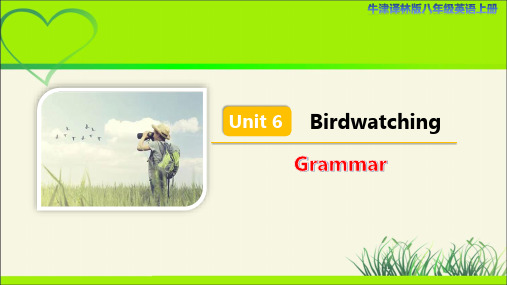
Unit 6
Grammar
Revision
Presentation
Review and answer
1. Does Hobo like to live in the wild? Why?2. Does Eddie want to be a wild animal? Why?
Post-reading
Pre-reading
Homework
Production
Practice
Think and write
Can you think of more verbs like this? Write as many as you can.eg. make sb. do
Presentation
Practice
Revision
1. Mr Wu ______ us _______ a pair of comfortable shoes because we would have to walk a long way. (ask/wear)2. We ______ some birds _____ in the trees. (hear/sing)3. Mr Wu _____ us ________ the birds carefully. (tell/watch)4. He also _______ us ___________ the birds. (want /describe)5. He _______ us ___________ in the wetlands. (advise/not shout)6. The cold weather _______ some birds ______ south for the winter. (make/fly)7. The trip _______ us __________ more about wildlife. (help/learn)
精选八年级英语上册Unit6BirdwatchingPeriod4Grammar听写本新版牛津版

Unit 6Birdwatching
Period 4Grammar
重点短语
根据汉语意思,写出相应的英文短语
1.写下,记下
2.听到一些鸟儿在树上唱歌
3.建议某人(不要)做某事
4.使一些鸟儿飞往南方过冬
重点句型
根据汉语意思,完成下列重点句型
1.随身带一个笔记本以便记下你看到的东西。
Takeanotebookwithyouwhatyousee.
2.吴先生同意让我参加他们学校的旅行。
MrWutheirschooltrip.
3.吴老师要求我们穿一双舒服的鞋子,因为我们将不得不走很长一段路。
MrWuapairofcomfortableshoesbecausewewouldhavetowalkalongway. 公交小句
根据汉语意思,完成下列公交小句
1.当我经过教室的时候,我听到有人正在唱歌。
IwhenItheclassroom.
2.为了早起,史密斯先生叫他的儿子不要观看足球比赛到太晚。
MrSmithhissonthefootballmatchlate.。
八年级英语上册 Unit 6 Bird watching Grammar教案 (新版)牛津版
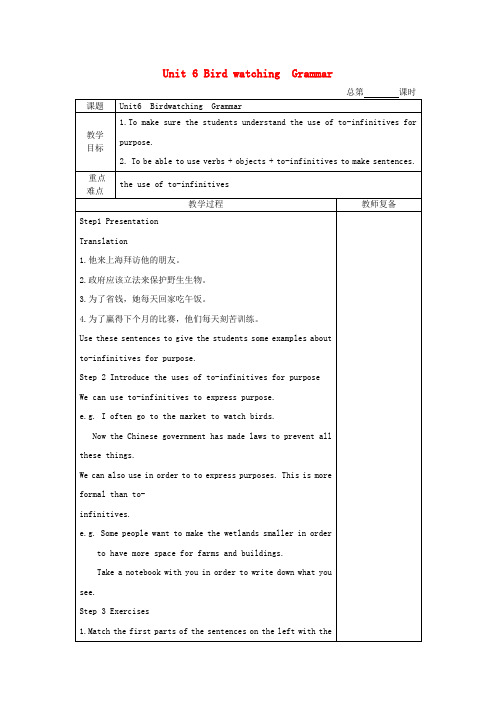
Unit 6 Bird watching Grammar中国书法艺术说课教案今天我要说课的题目是中国书法艺术,下面我将从教材分析、教学方法、教学过程、课堂评价四个方面对这堂课进行设计。
一、教材分析:本节课讲的是中国书法艺术主要是为了提高学生对书法基础知识的掌握,让学生开始对书法的入门学习有一定了解。
书法作为中国特有的一门线条艺术,在书写中与笔、墨、纸、砚相得益彰,是中国人民勤劳智慧的结晶,是举世公认的艺术奇葩。
早在5000年以前的甲骨文就初露端倪,书法从文字产生到形成文字的书写体系,几经变革创造了多种体式的书写艺术。
1、教学目标:使学生了解书法的发展史概况和特点及书法的总体情况,通过分析代表作品,获得如何欣赏书法作品的知识,并能作简单的书法练习。
2、教学重点与难点:(一)教学重点了解中国书法的基础知识,掌握其基本特点,进行大量的书法练习。
(二)教学难点:如何感受、认识书法作品中的线条美、结构美、气韵美。
3、教具准备:粉笔,钢笔,书写纸等。
4、课时:一课时二、教学方法:要让学生在教学过程中有所收获,并达到一定的教学目标,在本节课的教学中,我将采用欣赏法、讲授法、练习法来设计本节课。
(1)欣赏法:通过幻灯片让学生欣赏大量优秀的书法作品,使学生对书法产生浓厚的兴趣。
(2)讲授法:讲解书法文字的发展简史,和形式特征,让学生对书法作进一步的了解和认识,通过对书法理论的了解,更深刻的认识书法,从而为以后的书法练习作重要铺垫!(3)练习法:为了使学生充分了解、认识书法名家名作的书法功底和技巧,请学生进行局部临摹练习。
三、教学过程:(一)组织教学让学生准备好上课用的工具,如钢笔,书与纸等;做好上课准备,以便在以下的教学过程中有一个良好的学习气氛。
(二)引入新课,通过对上节课所学知识的总结,让学生认识到学习书法的意义和重要性!(三)讲授新课1、在讲授新课之前,通过大量幻灯片让学生欣赏一些优秀的书法作品,使学生对书法产生浓厚的兴趣。
牛津译林英语八年级上册Unit6 Grammar (共28张PPT)

Why did children go to the market?
They went to the market to buy some food.
用所给单词的适当形式填空 • 1. Speak loudly _t_o___m_a_k_e(make) us hear you.
To give/In • 2.order to givheer mother a surprise, Lucy planned
a birthday party without telling her.(give)
• 3. We decided to put up some posters __t_o__t_e_ll__
people the importance of saving birds. (tell)
• 4. It’s cruel of the hunters to kill wild animals
• A. eads
• ( ) 2. The teachers often tell their students _____ across the road when the traffic light is red.
A. not go B. not to go C. don’t go
——Peter invited me ____________ on a trip to Yuntai Mountain.
A. to go B. go C. going D. Went
• ( )5. Our English teacher advises us ____________part in all kinds of after-class activities. A. to take B. take C. taking D. to taking
【牛津版】八年级上册:Unit 6 Bird watching Grammar课件
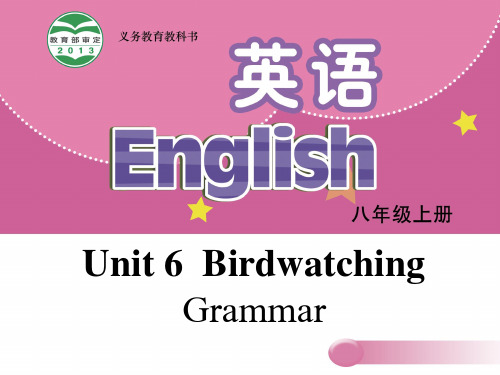
Work out the rules
1. They went to the seaside to go fishing.
2. They went to the market to buy some food.
We often use
to-infinitives
For purpose
Find more with to-infinitives for purpose
More sentences with to-infinitives:
invite sb to do sth need sb to do sth
Work out the rule
verbs + object + to-infinitives + sb to do sth
tell, ask, get, invite, need, want …
The zookeeper let/made dolphins play some tricks.
Pay attention:
We can use some verbs with infinitives to ”. without “___
make
let have sb do sth see
hear
see sb doing sth
Correct the mistakes
1. The boss made the workers to work for more than 8 hours.
2. My father asked me spend more time
to spend 3. She often hears someone to sing in the park. on Maths.
【教育专用】2017_2018学年八年级英语上册Unit6Birdwatching第4课时Grammar教案新版牛津版

Step4:Show"Guide Two"to the students.
Guide Two________
Read the sentences and help the students to understand that we can use some verbs and to-infinitives.
Step3:Show"Guide uide One
Read the sentences and help the students to understand that we can use to-infinitives to express purpose.
教学设计
Teaching procedures:
Step 1:Daily greetings:
T:Good morning,everyone.
S:Good morning.
T:How are you?
S:I'm fine,thank you.And you?
T:I'm OK.Thank you.Sit down,please.
板书设计
Grammar
课后反思
Unit 6 Bird watching
课题及内容
Grammar
总课时数
7
教学
目标
1.学习用动词不定式to do和in order to表示目的。
2.掌握“动词+宾语+动词不定式do do”结构。
教学
重、难
点
1.学习用动词不定式to do和in order to表示目的。
2.掌握“动词+宾语+动词不定式do do”结构。
八年级英语上册 Unit 6 Birdwatching Period 3 Grammar练习牛津版

Unit 6 BirdwatchingGrammarPeriod 3●1 Take a notebook with you in order to write down what you see.带上笔记本,以便记下你所看到的东西。
[探究] ____________意为“写下,记下”,为“____________”结构,后接________时,________可放在两词之间,也可放在down的后面;后接________时,一定要放在两词中间,且代词要用________形式。
活学活用1. 看黑板上的这个句子。
请把它记下来。
Look at the sentence on the blackboard. Please _________________________________.●2 She saw a baby panda drink her mother's milk.她看见一只小熊猫喝她妈妈的奶。
[探究] see sb do sth意为“________________________”,强调看见动作的________或动作________发生。
I often see the dog cross the busy street alone.我经常看到那条狗独自穿过繁忙的街道。
[拓展] (1)____________________意为“看见某人正在做某事”,强调动作________进行。
I saw him talking with his friends over there.我看到他和他的朋友正在那边谈话。
(2)英语中与see有类似用法的________动词还有hear, watch, feel, notice等。
2.2017·徐州I saw Tom ________ his key in the lock, turn it and open the door.A.put B.puttingC.puts D.to put语法聚焦[动词不定式]1.I often go to the market to watch the birds.2.Now the Chinese government has made laws to prevent all these things.3.Some people want to make the wetlands smaller in order to have more space for farms and buildings.4.Take a notebook with you in order to write down what you see.5.We are now inviting them to help us.6.We need more people to count and describe the birds.●1 不定式作目的状语不定式作状语常用来表示________,可位于句首或句末。
- 1、下载文档前请自行甄别文档内容的完整性,平台不提供额外的编辑、内容补充、找答案等附加服务。
- 2、"仅部分预览"的文档,不可在线预览部分如存在完整性等问题,可反馈申请退款(可完整预览的文档不适用该条件!)。
- 3、如文档侵犯您的权益,请联系客服反馈,我们会尽快为您处理(人工客服工作时间:9:00-18:30)。
(In order to catch the early bus, I got up early this morning.)
Step 4 Using verbs + objects + to-infinitives
1 We can use some verbs with objects and to-infinitives.
Mr Wu agreed to let me join their school trip.
see or hear + object + infinitive without to
She saw a baby panda drink her mother's milk.
Millie and Amy heard someone sing in the park.
个人初备案
二次备课
Step1 Presentation
Translation
1.他来上海拜访他的朋友。
2.政府应该立法来保护野生生物。
3.为了省钱,她每天回家吃午饭。
4.为了赢得下个月的比赛,他们每天刻苦训练。
Use these sentences to give the students some examples about to-infinitives for purpose.
教学重点
To make sure the students understand the use of to-infinitives for purpose.
教学难点
To be able to use verbs + objects + to-infinitives to make sentences.
2.More exercises
我呆在那儿看看会发生什么。
(I stayed there to /in order to see what would happen.)
为了不忘记,他记下了我的电话号码。
(He wrote down my telephone number in order not to forget it.)
Step 2 Introduce the uses of to-infinitives for purpose
We can use to-infinitives to express purpose.
e.g. I often go to the market to watch birds.
Now the Chinese government has made laws to prevent all these things.
e.g. We are now inviting them to help us.
We need more people to count and describe the birds.
2 We add not before to-infinitives to express a negative meaning.
help + object + infinitive without to
This will help people (to) understand the importance of the wetlands.
Step 5 Exercises
plete the sentences with the correct forms of the verbs in brackets. Ss’ books Page 74)
Unit 6Bird watching
教学目标
To make sure the students understand the use of to-infinitives for purpose.
To be able to use verbs + objects + to-infinitives to make sentences.
e.g. We ask people not to catch birds for any reason.
3 Pay attention to these words:
We often use these verbs in this structure.
advise ask cause encourage get help invite
order teach tell
4 Special words
We can use some verbs in this structure with infinitives without to.
make or let + object + infinitive without to
Max tells funny jokes and often makes me laugh.
We can also use in order to to express purposes. This is more formal than to-infinitives.
e.g. Some people want to make the wetlands smaller in order to have more space for farms and buildings.
Step 6 Homework
Recite the related phrases with to-infinitives.
板书设计
教学反思
Take a notebook with you in order to write down what you see.
Step 3 Exercises
1.Match the first parts of the sentences on the left with the second parts on the right.Write the correct letters in the blanks.(Page 73)
